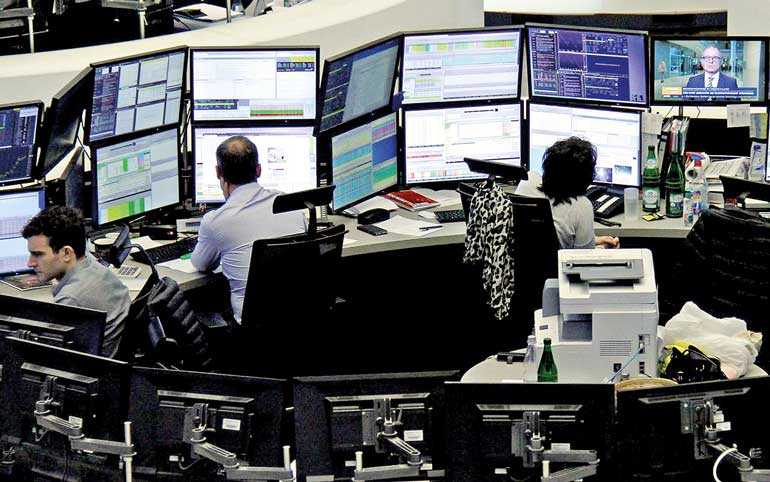Thursday Feb 26, 2026
Thursday Feb 26, 2026
Thursday, 29 August 2019 00:21 - - {{hitsCtrl.values.hits}}

LONDON (Reuters): World stocks nudged down on Wednesday as deepening inversion of the US bond yield curve a day earlier threw up reminders of looming recession risks, sending investors toward safe havens such as the Japanese yen and precious metals.
The US yield curve inverted further on Tuesday to levels not seen since 2007, rekindling fears of a looming recession and fuelling a sell-off on Wall Street. An inversion of the yield curve has historically been a highly accurate predictor of a US recession.
MSCI’s world equity index, which tracks shares in 47 countries, fell 0.1%, dragged down by European shares. The broad Euro STOXX 600 fell 0.3%, with bourses in Paris and Frankfurt fell 0.3% and 0.4% respectively.
Still, Wall Street futures gauges suggested US stocks would show more resilience, forecasting gains of around 0.3%.
London’s bourse bucked the trend, turning positive after sterling fell on a tweet by a BBC journalist that Britain’s Queen Elizabeth could be asked as early as Wednesday to agree to suspend parliament. It was last up 0.2%.
“It’s become very difficult for investors to garner an idea of where we go to next,” said Michael Hewson, Chief Market Strategist at CMC Markets. “The weakness in bond yields, and the strength in havens speaks to an investor that is becoming increasingly risk averse.”
The 10-year Treasury yield fell to around 6 basis points below the two-year yield, with the 10-year yield at 1.494%, close to a three-year low touched on Monday.
Longer-dated bond yields also fell. US 30-year Treasury yields slumped to a few record low, touching 1.906% and were last down six basis points on the day.
Some investors said market fears of a looming recession, would further support expectations that the US Federal Reserve would cut interest rates further - something they warned is not a foregone conclusion.
Federal funds futures implied traders saw a 91% chance of a 25 basis point rate cut by the US central bank next month, and a 100 basis point cut within 2020.
“The market is pricing another 100 basis points cut from the Fed by next year, but the Fed seems rather reticent to follow where the market is indicating it should go,” said Peter Schaffrik, head of European rates strategy at RBC Capital Markets.
The renewed fears of a global economic slowdown bolstered demand for assets perceived as safe havens.
Gold recovered some of its early losses to last trading at $1,539.98, down 0.1%. Silver gained 0.8%, on course for its fourth straight day of gains.
In currencies, the Japanese yen kept a grip on its recent gains. The yen, seen as a safe haven in part because of Japan’s large trade surplus and a tendency for domestic investors to repatriate money in times of market turbulence, traded at 105.77 per dollar. It held its gains from the previous day, when it advanced 0.35% to a seven-month peak. The dollar index, which measures the greenback against a basket of currencies, rose a sliver of a gain to 98.042. Currencies that tend to perform well when investors buy into riskier assets, such as the Australian and New Zealand dollars, fell. The pound, already trading lower on the day, extended its drop after senior BBC journalist Nick Robinson said on Twitter that Britain’s queen could be asked to suspend parliament. It fell to hit $1.2220, down 0.5%.
British Prime Minister Boris Johnson has said Britain will leave the European Union on 31 October with or without a deal. Media have previously reported that he wants to suspend parliament to help force through an exit.